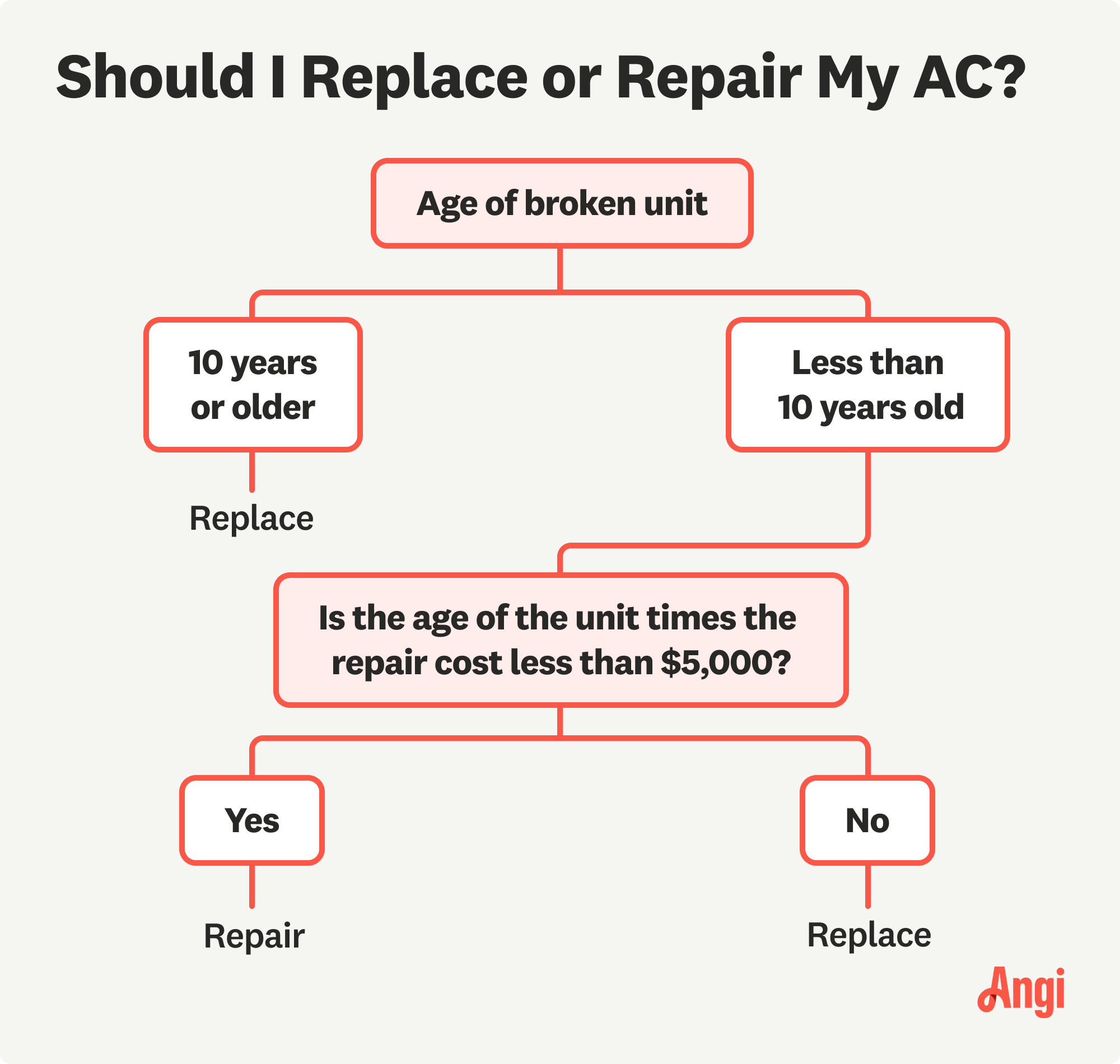
If you’re having problems with your air conditioner’s condenser, it may be time for an upgrade. Learn about the cost to replace an AC condenser in this guide.
What to do when your AC is playing it a little too cool


If your AC won’t stop running, there might be an issue with the thermostat, refrigerant, or wiring.
A stuck limit switch or blocked ductwork can also cause your AC to run nonstop.
In other cases, the problem might be that your AC unit is too old or too small.
You should hire an AC repair pro to deal with refrigerant or electrical issues.
In the heat of summer, you expect your air conditioner to work hard and keep your home cool. But if your AC is constantly running (even after you’ve turned it off), there might be a problem with the AC unit or another part of your HVAC system. Keep reading to learn about the most common causes of an AC that runs nonstop, as well as the next steps for fixing each one.
Sometimes, user error could cause your AC to run constantly—especially if you have a new thermostat or HVAC system that you aren’t familiar with yet. For example, maybe you mistakenly set the AC to “on” instead of “auto.” Reviewing your user manual will help you understand your system’s settings and features.
Over time, dirt, dust, and other debris can collect inside your AC unit, reducing its efficiency. If your AC won’t stop running, it could be due to a dirty filter, condenser, fan, or other component. You should change your AC filter once every three months. But if you use thin filters, have pets, or smoke indoors, it’s better to swap it out monthly.
If your filter is clean, there may be buildup in another part of your AC unit. For example, leaves, sticks, and grass clippings can accumulate inside your condenser unit (the outdoor part of your air conditioner). The evaporator coils on your indoor unit can get dirty, too. Cleaning these AC components can help your air conditioner start working normally again.
The EPA prohibits handling AC refrigerant without a license. This is one DIY project you shouldn’t try—having a licensed AC repair technician refill your AC refrigerant is the safest (and legal) option.
Your AC unit contains refrigerant (sometimes called freon), which absorbs heat to produce chilly air for your home. If you have a refrigerant leak, your air conditioner may not be able to cool the air—but it will keep trying, leading to an AC unit that runs nonstop.
Refrigerant leaks are dangerous, so you shouldn’t try to fix one yourself. Exposure to refrigerants can lead to dizziness, headaches, nausea, loss of consciousness, and asphyxiation, according to the U.S. Environmental Protection Agency.
If your fan limit switch gets stuck in the “on” position, it will force the fan to keep running—even when the AC isn’t on. You can investigate this issue yourself, but if you don’t know where the fan is or aren’t sure how to reset it, call a local AC repair pro.
Loose or disconnected electrical wires inside your AC unit can cause your air conditioner to run constantly. If you don’t know how to work with electricity safely, bring in a pro to fix any wiring issues with your AC unit. Otherwise, you could damage your HVAC system, shock yourself, or start a fire.
During the typical 10-year lifespan of a thermostat, its sensors can get pretty dirty. When that happens, your thermostat may struggle to read the temperature in the room—and, as a result, tell your AC to continue running. Over time, a thermostat’s wiring can also come loose and get out of sync with your AC, causing it to run nonstop.
If you have intermediate DIY skills, you can replace a thermostat in about 30 minutes. If not, hire an electrician or HVAC technician to do it for you.
Blocked air ducts or partially closed dampers can also force your AC to run constantly. To check for this problem, turn on your air conditioner and observe whether or not cold air comes out of all of the vents in your home. If not, it may be time to clean your ductwork.
An undersized AC has to work harder to cool your home, often running for hours on end. And in some cases, it still won’t feel cool enough inside your house—despite the AC being on constantly. If you think your air conditioner might be too small for your space, contact an HVAC professional to figure out the right size AC unit for your home.

At some point, every AC unit will reach the end of its life (whether we like it or not). If yours has been trucking along for a decade or more, you might be due for an upgrade.
As a guideline, you can use the “$5,000 rule” to figure out whether to repair or replace your AC unit. To do that, multiply the unit’s age by the repair cost. If it comes out to less than $5,000, consider repairing it. But if it’s more than $5,000, it’s better to replace it.
From average costs to expert advice, get all the answers you need to get your job done.

If you’re having problems with your air conditioner’s condenser, it may be time for an upgrade. Learn about the cost to replace an AC condenser in this guide.

Switching from oil to gas heating could impact your savings. This guide will help you understand the cost to convert from an oil furnace to a gas furnace.

The average boiler installation cost depends on size, system type, and other factors. Keep reading to learn the cost of a new boiler.

Ductwork losing energy? Here are six duct sealing methods that will help you get some big savings on your monthly energy bills.

Prepping your furnace can extend the life of your unit and stop costly repairs. Follow these furnace maintenance tips for a warm, stress-free winter.

Tackling unwanted odors from indoor plants can be tricky. Learn how to use a carbon filter in your duct fan to improve air quality.